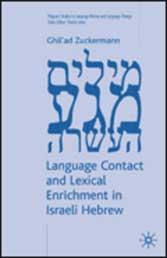
LANGUAGE CONTACT AND LEXICAL ENRICHMENT IN ISRAELI HEBREW
By GHIL'AD ZUCKERMANN
Subjects: Foreign elements, Language and languages, Historical lexicology, Hebrew language, Language revival, Sociolinguistics, New words, Lexicology, Languages in contact, Etymology
Description: Israeli Hebrew is a spoken language, 'reinvented' over the course of the twentieth century. It has responded to the social demands of the newly emerging state, as well as to escalating globalization, with a vigorously developing lexicon, enriched by multiple foreign language contacts. In this detailed and rigorous study, the author provides a principled classification of neologisms, their semantic fields and the roles of source languages, along with a sociolinguistic study of purists' and ordinary native speakers' attitudes towards lexical enrichment. His analysis of the tension between linguistic creativity and the preservation of a distinct language identity takes the discussion beyond the case of Israeli, through innovative comparisons with Revolutionized Turkish, Mandarin Chinese, Japanese, Arabic, Yiddish, Estonian, Swahili, pidgins and creoles, and other languages. At the beginning of the third millennium, our world is characterized by worldwide communication and the vast distribution of technological and 'talknological' devices. The mobility of the word respects no borders and the extent of that mobility may not be paralleled even in future (less heterogeneous) generations. The study of the modes and dynamics of language contact could hardly be more timely. Contents Acknowledgements Abbreviations Introduction 1. New Perspectives on Lexical Enrichment 2. The Case of Israeli: Multisourced Neologization (MSN) as an Ideal Technique for Lexical Enrichment 3. Addition of Sememe Versus Introduction of Lexeme 4. MSN in Various Terminological Areas 5. Sociolinguistic Analysis: Attitudes Towards MSN in 'Reinvented Languages' 6. The Source Languages 7. Statistical Analysis 8. Conclusions and Theoretical Implications Appendix: Transcription, Transliteration and Translation References Index Review Excerpts '..fascinating and multifaceted... a paean to linguistic creativity. It is especially timely in the present historical context of rapid globalization and linguistic inter-influence.' Professor James A. Matisoff, Department of Linguistics, University of California, Berkeley 'The volume is extremely impressive. Zuckermann demonstrates a mastery of European and Hebrew lexicography... In addition to developing a rigorous analytical framework, he offers many detailed word (and compound) histories and carves out a well-defined position on issues of much significance.' Jeffrey Heath, Professor of Linguistics, University of Michigan '...this is the first time that anyone has drawn attention to the extent to which 'phono-semantic matching' applies in word formation...a most important contribution to the study of Israeli Hebrew word formation in particular and of language change in general.' Shmuel Bolozky, Professor of Hebrew, University of Massachusetts 'This book will interest not only researchers and graduate students in the topic but also Hebraists. Moreover, any layman who loves words will find it absorbing and entertaining... it is both scholarly and original [and] an outstanding contribution to the science of etymology.' Professor Geoffrey Lewis, St Antony's College, University of Oxford 'The book is an outstanding piece of scholarship which undoubtedly represents a milestone in the field of lexicology. Zuckermann's attention to details has made the work a mini-encyclopaedia, much in the tradition of Jewish scholarship. Generally, his etymologies are well thought out and set a standard for current and future research.' Joseph T. Farquharson, LinguistList http://www.linguistlist.org/issues/16/16-1399.html Subject List Language and culture; Languages in contact; Lexicology; Linguistics; Aavik; Afroasiatic languages; American English; Americanization; Anthropology; Anthropological linguistics; Arabic language; Aramaic; Arts; Asian languages; Ben-Yehuda;; Bible; Bilingualism; Bloomfield; Borrowing; Camouflage; Change; Chinese language; Comparative linguistics; Contact linguistics; Creativity; Creole dialects; Culture; Derrida; Dictionaries; Education; English as the global language; English language--Foreign countries; English language--Influence on foreign languages; Estonian; Etymology; Europe; Far East; Foreign Language - Dictionaries / Phrase Books; Foreign Language Study; French language--Influence on foreign languages; Gender; German language--Influence on foreign languages; Globalization; Grammar, Comparative and general--Word formation; Greek language--Influence on foreign languages; Hamito-Semitic languages; Hebrew; Hebrew language--Foreign words and phrases; Hebrew language--New words; Hebrew language--Revival; Hebrew language--Word formation; Historical linguistics; History; Human behaviour; Humanities; Indo-European languages; Innovation; Israel; Jamaican Creole; Japanese language; Imitation; ; Jewish learning and scholarship; Jewish languages; Judaic studies; Judaism; Language; Language and languages--Etymology; Language and languages--Orthography and spelling; Language planning; Lexical enrichment; Lexicography; Lexicon/lexis; Linguistic change; Mandarin; Medieval Hebrew(s); Middle East; Mishnah; Literature; Modern Hebrew; Morphology; Multilingualism; Non-fiction; Old Testament; Orthography; Philology; Phonetics; Phonology; Pidgin languages; Polish language--Influence on foreign languages; Politics; Portuguese; Purism; Rabbinic Hebrew; Reference; Religion; Revitalization; Revival; Revolutions; Russian language--Influence on foreign languages; Saussure; Semantics; Semitic languages; Singlish (Singaporean English); Social Science; Society; Sociolinguistics; Sociology; Spanish; Survival; Swahili; Psychology; Psycholinguistics; Talmud; Turkish language; Vernacular; Vernacularization; Vocabulary; Yiddish language; Words; Writing; Written communication.
Comments
You must log in to leave comments.